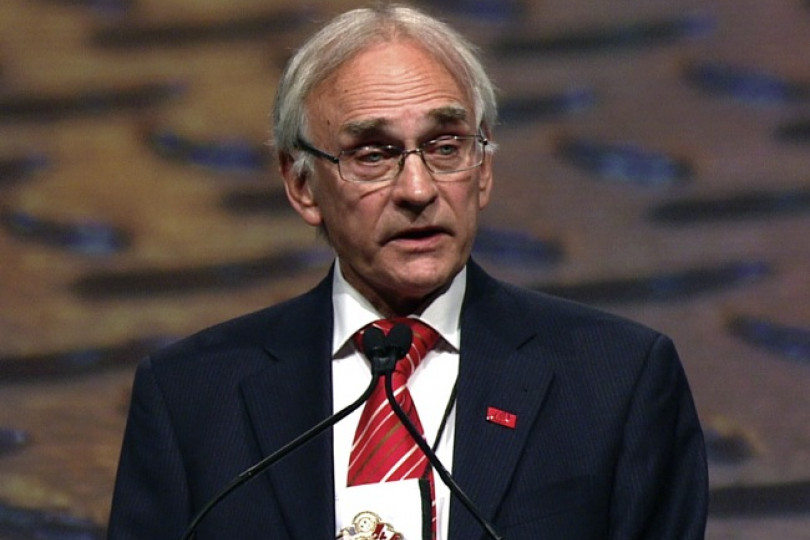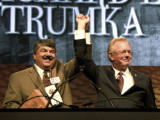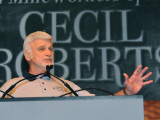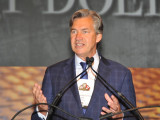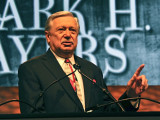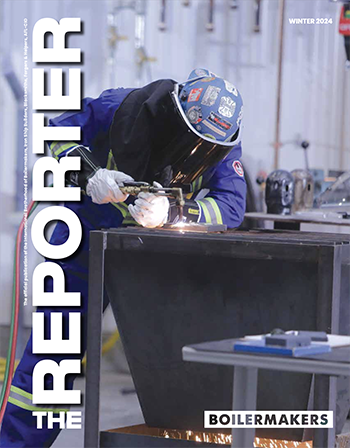Antiunion attacks in Wisconsin could become a global “virus.”
ICEM President Manfred Warda
View Photo Gallery (5 photos)
CONVENTION DELEGATES HEARD from top labor leaders and a government official on a wide range of issues affecting workers in North America and around the world. A common thread was the ongoing attacks by politicians on the rights of workers to organize and bargain collectively.
Manfred Warda, President of the ICEM (International Chemical, Energy, Mine, and General Workers Union), spoke about international solidarity. The ICEM represents 472 affiliated unions, including the Boilermakers, totaling 20 million members in 132 countries.
Warda said he and Phee Jung-sun, the ICEM’s Materials Section Officer were “most impressed with the unity that this convention has shown.” He thanked IP Newton B. Jones for serving the ICEM as President of the Materials Sector and as a member of the ICEM Executive Board. He also cited IVP Warren Fairley for his role as an alternate board member.
The ICEM’s work is especially important in countries such as Mexico, Colombia, and Iraq, where union organizers and workers are violently oppressed, Warda said.
Noting how workers have suffered under the global economic crisis, Warda blamed poorly-regulated banks, unbridled greed, and political demagogues for the mess. “But most shameful . . . is here in the United States of America,” he said. “Right-wing politicians are using deficit reduction as [an excuse] to strip workers of their trade union and bargaining rights. That has been a shock to trade unions all around the world.”
He added that the attack on worker rights in Wisconsin “must be stopped before it becomes a virus” spreading across the globe.
AFL-CIO President Richard Trumka inspired delegates with a rousing speech about the challenges faced by organized labor — focusing sharply on the political climate and the need to place union resources where it will do the most good.
He thanked delegates for their efforts in backing the Employee Free Choice Act. He noted that “while the act did not become law, the fight helped bring us a National Labor Relations Board that is actually doing its job protecting workers, and it has energized the entire labor movement.
“And while you were mobilizing, getting those signatures of support for workers’ rights,” he said, “who knew that we would also get the international attention to collective bargaining that we’ve wanted for years? Thanks to an outrageous, overreaching governor in Wisconsin [Scott Walker], we were able to have that debate. I guarantee you, he wasn’t counting on the reaction he got. By a 2-1 margin, the American public believes that every worker . . . ought to have the right to have a collective bargaining agreement.”
Trumka added that organized labor must “walk through the fire together” to rebuild worker rights and the middle class. He brought delegates to their feet in applause, saying, “This is our time; this is our moment; this is the time for the working class to stand up and demand dignity and a fair share of what we produce.”
United Mine Workers President Cecil Roberts energized the convention with a passionate address that quoted Bible passages and castigated the rich and powerful who demand cutbacks in social programs while giving up nothing themselves.
“When you hear Republicans say — but Democrats say it sometimes, too — everything’s on the table, I want you to know, that’s a lie. The millionaire’s money is not on the table. The billionaire’s money is not on the table. The CEO’s salary is not on the table. GE, the largest corporation in the world, paid zero taxes to the federal government.
“I’ll tell you what infuriates me. I have a 92-year-old mother – her Social Security’s on the table; her Medicaid’s on the table. Where are the principles of the Democratic Party [who should be saying], Wait a minute! Cecil Roberts’ 92-year-old mother is just as important as that CEO who’s running GE!”
Roberts offered high praise for the Boilermakers’ International leadership. “Today I stand here proudly with your president,” he said. “You have some of the best leadership in the labor movement. These people are visionaries along with your president, President Jones. These people are the blood of your blood, the flesh of your flesh, and the soul of your soul. They have shown the way for all of us.”
Canadian Ambassador to the United States Gary Doer spoke about the strong military and economic cooperation that exists between Canada and the United States and expressed his desire that the two countries work even more closely together toward energy independence.
He discussed the economic and job benefits of two proposed projects: a bridge between Detroit and Windsor, Ontario, and a pipeline to carry oil from the Alberta oil sands into the United States. “We think it makes more sense to buy oil from Canada than oil from Libya,” he said. “We think pipelines will produce more energy security for the United States and more economic growth and jobs in the United States and Canada. We not only get energy security by working together, we get economic security. A refinery that’s built or an upgrader that’s manufactured in Canada and the United States makes good economic sense.”
I guarantee you [$35 billion in Canadian shipbuilding funds] will be invested in shipbuilders and Boilermakers in Canada and the United States.
Doer added that $35 billion in ship construction projects that are planned in Canada will benefit both countries. “I guarantee you; those contracts won’t be awarded to a country outside Canada and the United States. That $35 billion will be invested in shipbuilders and Boilermakers in Canada and the United States. We’re very proud of that.”
Easing restrictions for Boilermakers to travel between the two countries for work is essential, Doer said. “We think regulatory reform should include the ability of workers with the tickets and skills to be able to work in both of our countries when there are jobs that need to be done and workers who need a job.”
BCTD President Mark Ayers delivered a candid and uplifting address. He ripped national political leaders for failing to give top priority to creating jobs, but he also issued a challenge to construction trade unionists to seek excellence in their craft.
Ayers said that today “misguided leaders are more concerned about Wall Street’s bottom line” than the plight of millions of unemployed Americans. I regretfully submit to you that the failure to create American jobs is a choice, not simply an economic reality.” He added, “These misguided leaders are singularly focused on low taxes for the most fortunate among us. They don’t care how working Americans will feed their families and put roofs over their heads.”
He said the stimulus was not large enough to create and sustain good-paying jobs and that more needs to be invested in our infrastructure, creating jobs and improving America’s roads, bridges, electric generation facilities, and other essential projects.
Ayers praised BCTD unions for the strides they have made in providing the best-trained and most highly-skilled construction workers in the industry. He noted that today BCTD unions have more than 1,000 state-of-the-art apprentice training facilities — an investment of over $1 billion annually.
Even with their superior skills and the value union trade workers bring to projects, Ayers said an occasional poor performance can cause problems with perception that affects all union trade members across the country. “We must demand of each other nothing less than stellar performance — every minute, every hour, and every single day. That is what the customer pays for. It’s what the customer expects. It’s what the customer deserves.”
